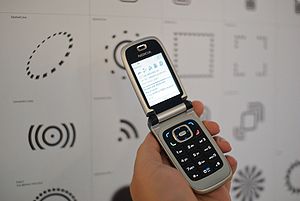Near Field Payment Coming to USA
Posted by Sam Churchill on November 16th, 2010 AT&T, T-Mobile USA and Verizon Wireless today announced a joint venture called ISIS, using Near Field Communications to transform how people shop, pay and save. AT&T, Verizon Wireless and T-Mobile USA are planning to run NFC payments trials in Atlanta and three other US cities, according to Bloomberg.
AT&T, T-Mobile USA and Verizon Wireless today announced a joint venture called ISIS, using Near Field Communications to transform how people shop, pay and save. AT&T, Verizon Wireless and T-Mobile USA are planning to run NFC payments trials in Atlanta and three other US cities, according to Bloomberg.Smartphone payments would provide competition for card networks like Visa, MasterCard, and American Express, who have their own NFC programs in the works.
 The initial focus of Isis will be on building a mobile payment network that utilizes mobile phones to make point-of-sale purchases with a swipe, using near-field communication.
The initial focus of Isis will be on building a mobile payment network that utilizes mobile phones to make point-of-sale purchases with a swipe, using near-field communication.Isis expects to introduce its service in key geographic markets during the next 18 months. Discover, the US’ fourth largest payments network, ran an extensive mobile payments test using contactless stickers in 2009 and is expected to be responsible for handling the joint venture’s payments processing requirements.
NFC enables data exchange when a device is within about 4 inches of a reader. The technology combines the unique ID number of RFID with the interface of a smartcard. Google’s new Android 2.3 will have support for NFC built-in.
Opening this year’s Web 2.0 Summit in San Francisco, Google CEO Eric Schmidt showed off the Nexus S phone, which will contain a Near Field Communication chip, that will allow people to use their phones like credit cards. Schmidt stressed that Google had no alliances with any retailers and those relationships would be put in place by the credit card companies and retailers independent of the search giant.
Discover Financial Services will work with Isis to develop the overall infrastructure for the mobile payment network, while Barclaycard US, part of Barclays, will be the first credit issuer on the network. Meanwhile, Isis is leaving the door open to other banks, financial institutions, and wireless carriers that want to be part of the new venture.
Besides Google, long-time NFC backer Nokia has announced plans to integrate the technology into a number of its Symbian-based smartphones in 2011. The Nokia C7, which started shipping in October, has an integrated NFC chip, but the smartphone needs a software upgrade for it to work, according to a spokesman. Nokia hasn’t decided when the upgrade will be available, he said.
Recently, Swedish operator TeliaSonera started a pilot that will test using NFC-enabled phones as hotel keys. Guests will be able to check in and receive the key directly onto their mobile phones before arriving at the hotel, it said. The NFC Forum is working with the GSM Association and the Smart Card Alliance, among other industry organizations to bring the technology to market.
Users will can also tap on so-called smart posters with their phones to collect retail offers and other kinds of information or swap items like business cards or calendar notes by tapping their handsets together.
 In Hong Kong the equivalent ofEngland’s Oyster Card, acontactless smartcard launched in 1997, is now used by 95% of the population for everything from buying a cup of coffee to parking fees, and even as a key card for apartments. The NFC device in a phone behaves like an existing contactless card.
In Hong Kong the equivalent ofEngland’s Oyster Card, acontactless smartcard launched in 1997, is now used by 95% of the population for everything from buying a cup of coffee to parking fees, and even as a key card for apartments. The NFC device in a phone behaves like an existing contactless card.A mobile equipped with NFC technology could, for example, buy a concert ticket over the phone which would then hold those details, together with the details of the phone user, on the tag inside the handset. An RFID device at the concert would then “read” the concert ticket details on the tag when the phone is passed close to it.
Near Field Communication are coming to mobile handsets over the next 12 months, but not in the format originally envisioned, says ABI Research. MicroSD slots with NFC hardware promises to bypass both handset vendors’ and mobile network operators’ core involvement. New microSD offerings with NFC functionality are coming to market, joining stickers as a way to bring contactless connectivity to existing mobile handsets, according to ABI. Juniper predicts that NFC mobile payment transaction values will grow from $8bn in 2009 to $30bn in 2012.
source: dailywireless.org







No comments:
Post a Comment